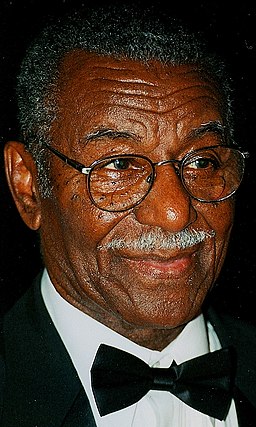I remember being elated when I had won the game for the first time. Sitting in a circle at the Birmingham Civil Rights Institute, docents in training would play the “Shuttlesworth game.” People would name quotes, books, or random facts about him, and if somebody repeated a detail or messed it up, they were immediately out. The circle would gradually lessen from 12 individuals to 5 people, ultimately to the winner. I was drawn into his storybook-like life story each time we played, and someone added a new fact.
Who is Fred Shuttlesworth?
Fred Shuttleworth’s fearless sacrifices to end segregation in Alabama make him an exceptionally competent individual that should not be forgotten. Salem Press Biographical Encyclopedia mentions, “[He became the] membership secretary for the Alabama branch of the National Association for the Advancement of Colored People (NAACP),” beginning his career in civil rights after being inspired by the infamous Brown vs. Board decision (Schafer). Shuttlesworth quickly made his way up the ranks, and consequently became an influential figure in the civil rights scene of Alabama. His determination to make a difference allowed him to navigate through the difficulties that attempted to bar his progress.
Fred Shuttlesworth’s Legacy:
He delved even further, founding his organization which became the most integral to civil rights in Birmingham. As proven by a bibliography about Fred Shuttlesworth published in Salem Press Biographical Encyclopedia, “After a circuit judge limited NAACP work in Alabama, Shuttlesworth created the Alabama Christian Movement for Human Rights…in 1956, serving as president through 1969” (Schafer). Although his work in such organizations should not go without credit, his fight for freedom did not stop there. He endured physical violence multiple times that threatened, and almost ended his life, which stood as a testament to his heroic courage.
Author of Fred Shuttleworth’s bibliography E. D. Schafer specifies he survived a bombing by the KKK of his house, a second bombing at his church, an attack at the segregated Philips High School after trying to enroll his daughters, and arrest for his outspokenness of integration. Influential figures such as Georgia Rep. John Lewis affirmed, “He was the soul and heart of the Birmingham movement. It was Birmingham…that brought the Civil Rights Act of 1964” (qtd. in Elliot). Shuttlesworth pushed ahead, undaunted by the efforts to stop him from altering the fate of Alabama forever.
Fred Shuttlesworth’s Dedication to Alabama:
Shuttlesworth’s dedication to improving Alabama throughout his life makes him a perfect representative of this state. Shuttlesworth’s efforts in the past continue to affect us even today. Author Manis Andrew of Fred Lee Shuttlesworth’s biography states, “Working with Birmingham’s first black mayor, Richard Arrington, Shuttlesworth helped bring to fruition the establishment of the Birmingham Civil Rights Institute and Museum.” His success in unionizing Black Americans angered white supremacists who attempted to undermine him, but failed. A long-time rivalry formed between Bull Conner, “who used both the police and fire departments to try to scare local African Americans away from the ACMHR’s well-attended weekly meetings,” and Fred Shuttleworth asserted by the Encyclopedia of Alabama (Manis, “Shuttlesworth”).
Even as the civil rights movement approached its end in the 1960s, Shuttlesworth stayed committed to sustaining it and his organization. The Encyclopedia of Alabama claimed he traveled every two weeks from Cincinnati to Birmingham after accepting a pastorate at a Baptist Church in Ohio (Manis, “Alabama”). Even after moving to a different state, Shuttlesworth never forgot his connection and hard work in Alabama.
The Personal Life of Fred Shuttlesworth:
In the case of Fred’s personal life, he was an exemplary person even before his involvement in the civil rights movement. Author E. D. Schafer expresses, “Working part time to supplement his family’s income, Shuttlesworth excelled scholastically at Rosedale High School, graduating as valedictorian in May 1940.” Shuttlesworth’s call to fame never occurred in the same way as it did for other prominent leaders in the Civil Rights Movement. His name has experienced praise, but the face behind that name remains a mystery for the masses.
Middle Georgia State University confirms that “Shuttlesworth was not as well-known as some other Civil Right[s] leaders because he chose to stay local and focus on Birmingham” (Etchison). There has been a push to bring Shuttleworth’s illustrious career to the forefront in the form of media, such as movies. Dr. Andrew Manis has tried translating his biography of Fred Shuttlesworth into a screenplay, but struggled with what to include as “[t] he life of Shuttlesworth held an abundance of rich historical content,” noted by a graduate of Middle Georgia State University Kelsei Etchison.
Fred Shuttlesworth’s sacrifices and dedication to bettering Alabama for future generations deserves acknowledgment. His work in civil rights affected him in all facets of his life, and it now progresses the conversation of racial equality forward for us today.
Works Cited:
Elliot, Debbie, et al. “Rev. Fred Shuttlesworth, Civil Rights Pioneer, Dies.” NPR, 5 October 2011, https://www.npr.org.
Etchison, Kelsei. “MGA Professor Turns His Biography of Civil Rights Icon Into Screenplay.” Middle Georgia State University, 25 September 2017, https://www.mga.edu.
Manis, Andrew. “Alabama Christian Movement for Human Rights (ACMHR).” Encyclopedia of Alabama, 3 June 2010, https://encyclopediaofalabama.org.
Manis, Andrew. “Shuttlesworth, Fred Lee.” Encyclopedia of Alabama, 9 March 2007, https://encyclopediaofalabama.org.
Schafer, E. D. Fred Shuttlesworth. Salem Press Biographical Encyclopedia, [s. l.], 2021. Disponível em: https://discovery.ebsco.com.
Want to learn more about Fred Shuttlesworth? Click here!

